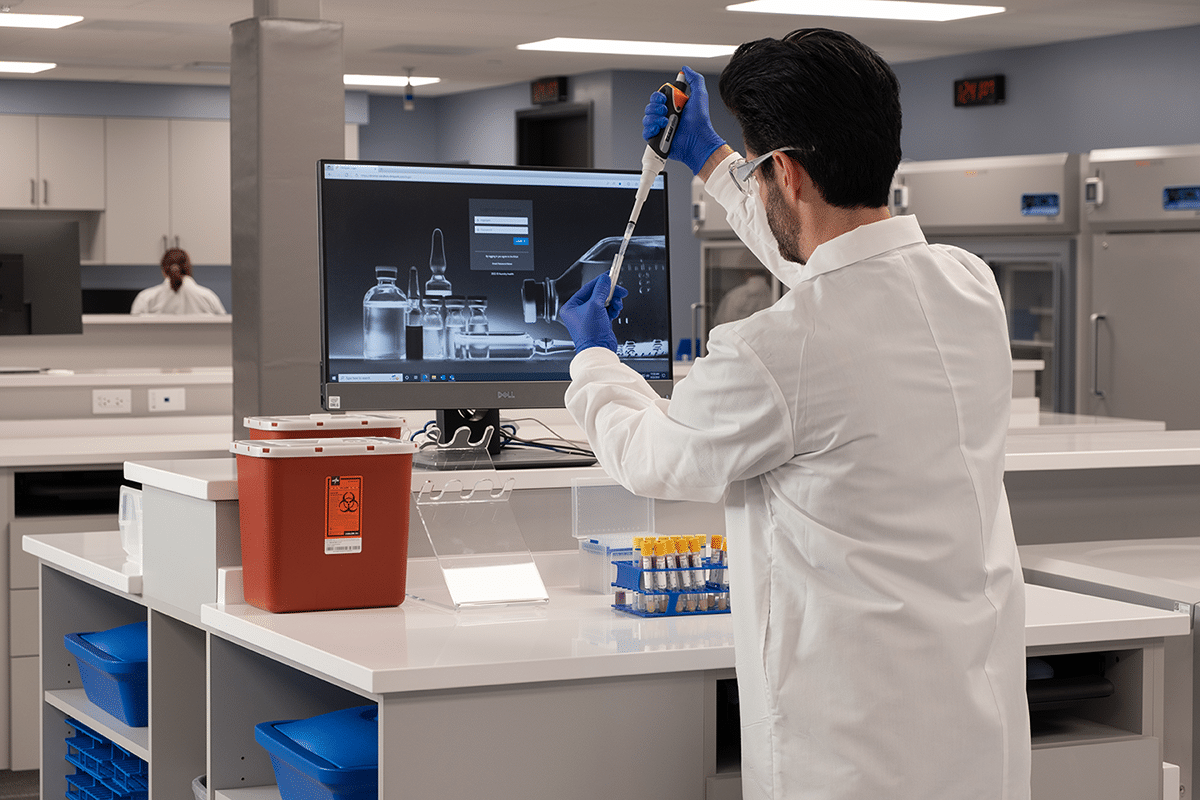Pharmacokinetic (PK) Studies
The collection of pharmacokinetic (PK) data provides valuable insight into multiple aspects of an investigational product. Sample collection for PK analysis (most commonly blood and urine) in normal healthy volunteers occurs prior to the administration of the study drug in a Phase 1 unit. Samples continue to be collected at designated timepoints post drug administration. In some cases, these studies will require that participants are confined to the facility overnight and for multiple days to enable serial monitoring and improve study compliance.
According to the guidance document Bioequivalence Studies With Pharmacokinetic Endpoints for Drugs Submitted Under an ANDA, it is recommended that between 12 and 18 PK samples be collected after study product administration and should extend through at least three or more terminal elimination half-lives of the drug (1). Per the guidance document Population Pharmacokinetics “As the number of samples per subject decreases, the importance of the timing of PK samples increases (2).” Therefore, it is critical that the samples be obtained as close as possible to the time point relative to the referenced dosing time.
The guidance continues, “We recommend recording the actual clock time when samples are drawn as well as the elapsed time related to drug administration (1).” Therefore, when operationalizing the study, it is imperative to structure the assessments outlined in the protocol to allow for precisely timed sample collection, and to build in sufficient time intervals between subjects.
Reach Out Today
If you would like to learn how DVCR can support your upcoming PK clinical study, please contact us.
Purpose-Built Clinical Pharmacology Unit for PK Clinical Trials
Dr. Vince Clinical Research is staffed with a team of highly trained and experienced phlebotomists who understand the requisite precision and time management skills necessary to conduct a PK clinical trial successfully. In addition, these phlebotomists are trained to perform a multitude of drawing techniques, including direct venipuncture, butterfly needle, or collection via an indwelling intravenous catheter.
Multiple aspects of our Phase 1 unit were designed to conduct successful PK studies:
- 90 beds for overnight confinement
- eSource/EDC with real-time data access for expedited dose escalation decisions
- KDeployment of barcode scanning functionality on wristbands and sample tubes for improved subject verification and precision timepoint capture
- KCountdown features for procedures
- Wall-mounted vital signs machines at each bedside to reduce data variability across subjects throughout the trial
- KIntegrated with eSource/EDC for automatic data upload
- Custom-built CLIA-registered sample processing laboratory
- KPK/PD sample processing and shipment
- KBarcode sample tracking from collection through shipment
- KElectronic step-by-step processing instructions at each station
- KAll refrigerated equipment is monitored 24/7 by audit-ready environmental monitoring system
- On-site cGMP pharmacy capable of handling and manipulating study drugs for various routes of administration
Purpose-Built Clinical Pharmacology Unit for PK Clinical Trials

Dr. Vince Clinical Research is staffed with a team of highly trained and experienced phlebotomists who understand the requisite precision and time management skills necessary to conduct a PK clinical trial successfully. In addition, these technicians are trained to perform a multitude of drawing techniques, including direct venipuncture, butterfly needle, or collection via an indwelling intravenous catheter.
Multiple aspects of our Phase 1 unit were designed to conduct successful PK studies:
- 90 beds for overnight confinement
- eSource/EDC with real-time data access for expedited dose escalation decisions
- KDeployment of barcode scanning functionality on wristbands and sample tubes for improved subject verification and precision timepoint capture
- KCountdown features for procedures
- Wall-mounted vital signs machines at each bedside to reduce data variability across subjects throughout the trial
- KIntegrated with eSource/EDC for automatic data upload
- Custom-built CLIA-registered sample processing laboratory
- KPK/PD sample processing and shipment
- KBarcode sample tracking from collection through shipment
- KElectronic step-by-step processing instructions at each station
- KAll refrigerated equipment is monitored 24/7 by audit-ready environmental monitoring system
- On-site cGMP pharmacy capable of handling and manipulating study drugs for various routes of administration
References
1 U.S. Department of Health and Human Services Food and Drug Administration & Center for Drug Evaluation and Research (CDER). (2021). Bioequivalence Studies With Pharmacokinetic Endpoints for Drugs Submitted Under an ANDA Guidance for Industry. In fda.gov. Retrieved July 20, 2023, from https://www.fda.gov/media/87219/download
2 U.S. Department of Health and Human Services Food and Drug Administration, Center for Drug Evaluation and Research (CDER), & Center for Biologics Evaluation and Research (CBER). (2022). Population Pharmacokinetics Guidance for Industry. In fda.gov. Retrieved July 20, 2023, from https://www.fda.gov/media/128793/download
